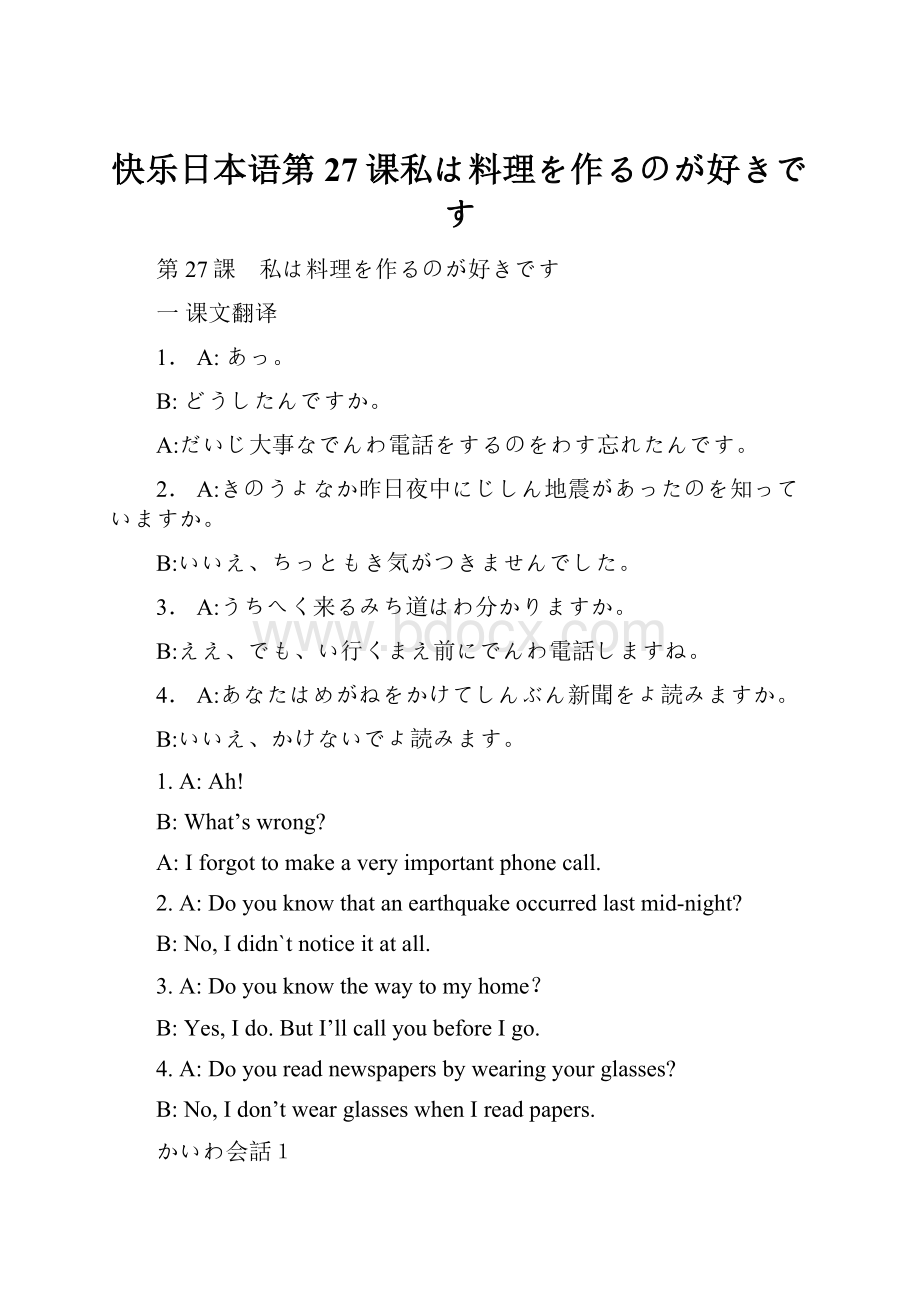快乐日本语第27课私は料理を作るのが好きです.docx
《快乐日本语第27课私は料理を作るのが好きです.docx》由会员分享,可在线阅读,更多相关《快乐日本语第27课私は料理を作るのが好きです.docx(24页珍藏版)》请在冰豆网上搜索。

快乐日本语第27课私は料理を作るのが好きです
第27課 私は料理を作るのが好きです
一课文翻译
1.A:
あっ。
B:
どうしたんですか。
A:
だいじ大事なでんわ電話をするのをわす忘れたんです。
2.A:
きのうよなか昨日夜中にじしん地震があったのを知っていますか。
B:
いいえ、ちっともき気がつきませんでした。
3.A:
うちへく来るみち道はわ分かりますか。
B:
ええ、でも、い行くまえ前にでんわ電話しますね。
4.A:
あなたはめがねをかけてしんぶん新聞をよ読みますか。
B:
いいえ、かけないでよ読みます。
1.A:
Ah!
B:
What’swrong?
A:
Iforgottomakeaveryimportantphonecall.
2.A:
Doyouknowthatanearthquakeoccurredlastmid-night?
B:
No,Ididn`tnoticeitatall.
3.A:
Doyouknowthewaytomyhome?
B:
Yes,Ido.ButI’llcallyoubeforeIgo.
4.A:
Doyoureadnewspapersbywearingyourglasses?
B:
No,Idon’twearglasseswhenIreadpapers.
かいわ会話1
マリマ:
すきや焼きをた食べるとき時、にほん日本のひと人はなま生たまごをつけてた食べるんですか。
いけだ池田 :
わたし私はつけてた食べるのがす好きですが、つけないでた食べるひと人もいますよ。
マリマ:
へえ、おもしろいですね。
1
Mary:
DoJapanesepeopledipraweggswheneatingSukiyaki?
Ikeda:
Ilikedippingraweggsbutsomepeopledon’t.
Mary:
Really?
Oh,It’sveryinteresting.
かいわ会話2.
しかい司会 :
にほん日本のまち町をある歩いて、なに何かき気がついたことがありますか。
スミス:
にほん日本ではじどうはんばいき自動販売機でビールやおさけ酒をか買うことができるんですね。
しかい司会 :
そうですね。
スミス:
わたし私のくに国ではみせいねんしゃ未成年者にはアルコールるい類をう売ってはいけないことになっていますから、アルコールのじどうはんばいき自動販売機はお置いていないんです。
それで、こども子供がじどうはんばいき自動販売機でビールなんかを買っているのを見て、本当にびっくりしました。
Dialogue2
Shikai:
WhatdoyounoticewhenyouwalkonthestreetsinJapan?
Smith:
InJapan,youcanbuybeerandalcoholicdrinkfromtheautomaticvendingmachine.
Shikai:
Yes,that’strue.
Smith:
Inmycountryitisnotallowedtosellalcoholicdrinktotheteenagers,sotherearenoautomaticvendingmachinestosellliquor.SowhenIseesomechildrenbuybeerorsomethinglikethatIamreallysurprised.
ほんぶん本文
きもの着物について
にほん日本のシンボルはなん何でしょうか。
みな皆さんはまずおも思いだ出すのはふじさん富士山とわふく和服でしょう。
きもの着物はにほん日本のでんとうてき伝統的なふく服で、いま今もにんき人気があります。
きもの着物についてなに何か知っていますか。
むかし昔、にほん日本はおとな大人もこども子供もみんなきもの着物をき着て生活していました。
しかし、きもの着物をき着るのはむずか難しいし、じかん時間もかかって、たいへん大変です。
またある歩くとき時も、しごと仕事をするとき時も、きもの着物はふべん不便なので、みんなようふく洋服をき着ます。
それににほんじん日本人のせいかつ生活もせいようか西洋化したので、きもの着物よりようふく洋服のほうがせいかつ生活にあ合います。
いま今ではきもの着物はせいじんしき成人式、しょうがつ正月などとくべつ特別なきかい機会だけにき着るものになりました。
Text
AboutKimono
What’sthesymbolofJapan?
WemayfirstthinkofMountFujiandkimono.KimonoisstillpopularasJapanesetraditionalclothes.Whatdoyouknowaboutkimono?
Onceuponatime,bothadultsandchildreninJapanworekimonos.Ittakestimesandeffortstoputonkimono.Itistroublesome.Besides,itisnotconvenientforpeopletowearkimonoswhilewalkingandworking,soeveryonewearswesternsuits.Inaddition,becauseofthewesternizationofJapaneselifestyle,comparedwithkimonos,thewesternsuitsaremoresuitableforlife.
NowadayskimonosareonlywornonsomespecialoccasionssuchasAdultCeremony,NewYear’sDayetc.
二单词
■夜中(よなか)n.themiddleofthenight;midnight
彼女は毎晩夜中の2時3時まで起きている
Shestaysuptillthesmallhourseverynight.
夜中に火事があった。
Afirebrokeoutinthemiddleofthenight.
■ちっともadv.notabit;notatall
この番組はちっとも面白くない。
Thisprogramisnotatallinteresting.
疲れましたか。
Areyoutired?
いいえ、ちっとも。
No,notabit.
ちっとも知らなかった
Ididn'tknowanythingatallaboutit.
ちっとも寒くない
Iamnot「intheleast[abit]cold.
この子はちっともじっとしていない
Thischildcan'tkeepstillforamoment.
■眼鏡(めがね)n.glasses;apairofspectacles;goggles
眼鏡を掛ける/外す
puton/takeoffone'sglasses
眼鏡をかけている
wearglasses
眼鏡をかけた男
amaninglasses/spectacles
■掛ける(かける)vt.hang;put;lock;makeaphonecall;put;wear
カレンダーを壁に掛ける
hangacalendaronthewall
絵が壁に掛けてある
Apictureishangingonthewall.
なべを火に掛ける
putapotonthefire
■生(なま)n.raw;uncooked;fresh;live
生のraw;uncooked;underdone;halfdone;fresh
生の牛肉
raw/uncookedbeef
生のキャベツ
rawcabbage
魚を生で食べる
eatfishraw[rawfish]
この豚肉はまだ生だ
Thisporkisunderdone/onlyhalfdone.
生放送
alivebroadcast
■付ける(つける)vt.attach;spread;apply;install
パンにバターを付ける
put/spreadbutteronbread/butterone'sbread
おしろいを付ける
putfacepowderon/powderone'sface
けがをした膝に薬を付けた
Iappliedsomemedicineto[putsomemedicineon]myinjuredknee.
■気がつく(きがつく)vi.notice
その間違いにすぐ気が付いた。
Iimmediatelynoticedthemistake.
■自動販売機(じどうはんばいき)n.vendingmachine;slotmachine
コーヒーの自動販売機
acoffeevendingmachine
■未成年者(みせいねんしゃ)n.minority;minor;infant
未成年である
beunderage
未成年者の飲酒を禁ずる
prohibitminorsfromdrinking(alcoholicbeverages)
■アルコールn.alcohol
彼はアルコールは全然だめだ
Hedoesnottouchalcohol[alcoholicbeverages].
■びっくりするvi.besurprised;beastonished;bestartled;beamazed
その知らせにびっくりした。
Iwassurprisedatthenews.
びっくりするほど流暢にイタリア語をしゃべった
HespokeItalianwithsurprising[amazing]fluenc.
■着物(きもの)n.clothes;clothing;garment;dress;kimono(traditionalJapanesecostume)
着物を着る
putonone'sclothes;getdressed
着物を脱ぐ
takeone'sclothesoff
りっぱな着物を着ている
bewell-dressed
■シンボルn.symbol
「はと」は平和のシンボルである
Thedoveisasymbolofpeace./Thedovesymbolizespeace.
■和服(わふく)n.kimono;Japanesedress
和服姿の女
awomanwearingakimono
■伝統(でんとうてき)n.tradition(al);convention(al)
伝統に従う
followatradition
伝統を守る
maintainatradition
伝統を重んじる人々
thosewhocherishtradition
伝統を破る
breakatradition
■かかるvi.(time)take;cost;hang;belocked
その実験は時間と金がかかる
Theexperimenttakestimeandmoney.
ここから駅までどのくらいかかりますか
Howlongdoesittakeyoutogofromheretothestation?
歩いて/バスで10分です
Ittakestenminutesonfoot/bybus.
その仕事をするには大変手数がかかる
Ittakesalotoftroubletodothework./Theworktakesalotoftroubletodo.
■合う(あう)vt.fit;suit;besuited;match;gowellwith
この服は私に合わない
Thisdressdoesnotfitme./Thisdressdoesnotsuitme.
私の好みにぴったり合う
Itsuitsmytasteperfectly.
この靴はパーティーに合わない
Theseshoesaren'tsuitablefortheparty.
■成人式(せいじんしき)n.adult;grown-up
成人するgrowup;attainmanhood/womanhood;becomeaman/woman
成人した息子
agrown-upson
これは成人向きの映画だ
Thisfilmisforadults.
■正月(しょうがつ)n.January;theNewYear
正月元旦
NewYear'sDay
正月休みtheNewYearholidays
■特別(とくべつ)a.n.adv.special;particular
特別にspecially;especially,particularly;exceptionally;unusually;extraordinarily
誕生日には何も特別なことはしません
Idonothingspecialonmybirthday.
特別な注意を払う必要がある
Thisneedsspecialattention.
あの人の声は特別大きい
Hisvoiceisexceptionallyloud.
今年の冬は特別寒い
Itisunusuallycoldthiswinter.
■機会(きかい)n.chance;opportunity
機会を得る
getanopportunity
こんな機会は一生に二度とないだろう
Achancelikethiscomesbutonlyonceinalifetime./Therewillneverbeanotheropportunitylikethis./It'snowornever.
■なんか p.(Usedtogiveexamples.)suchas;andthelike
お金なんか要りません
Iwantnomoney./Whowantsmoney?
君なんかに分かるものか
Youwouldn'tunderstand.
寂しくなんかない
WhyshouldIfeellonesome?
野球なんかするぐらいなら本を読みたい
Iwouldratherreadabookthandoanything(dumb)likeplayingbaseball.
ワインかなんかないの
Haven'tyougotanywineorsomething?
■~出す Occursasthesecondelementofcompoundverbs.Addedtothecontinuativebaseofaverbl.
▲[withatransitiveverb]takeout;putout;bringout
押し出す pushout
取り出す takeout
引き出す pullout
持ち出す carryout
追い出す driveaway
放り出す throwout
締め出す shutout
▲[withaintransitiveverb]goout;comeout
逃げ出す runaway
抜け出す sneakout
這い出す crawlout
飛び出す jumpout
▲[withatransitiveorintransitiveverb]start;begin
読み出す starttoread
歌い出す startsinging
歩き出す startwalking
降り出す begintorain[snow]
泣き出す burstoutcrying
■し p.and(also)(Usedforemphaticlisting)
あの店の料理はおいしいし、雰囲気もいい。
Thefoodinthatrestaurantisgood,andalsothereisapleasantatmosphere.
山本さんは優しいし、親切だ。
Mr.Yamamotoisgentle,andkind,too.
今日は日曜日だし、天気もいいし、どこかへ行きましょう。
TodayisSunday,andwhat’smoreisweatherisalsofine,solet’sgosomewhere.
■~化 suf.–ization(Achangeintothestatedconditon.)
映画化 makingintoamovie
合理化 rationalization
自由化 liberalization
三语法
语法一
N1が
V
N2
V:
じょうたいけい常体形V:
plainform
【解说】
1.「N1がV」は、N2をしゅうしょく修飾する。
「N1がV」modifiesN2.
◎これはあしたの授業で使う本です。
Thisisthebookwhichwewillusefortomorrow'sclass.
这是我明天上课要用的书。
◎A:
田中さんはどの人ですか。
WhichpersonisTanaka-san?
哪位是田中。
B:
田中さんはあそこに座っている女の人です。
Tanaka-sanisthewomanwhoissittingoverthere.
坐在那边的那个女人是田中。
◎あれはわたしが通った高校です。
ThatistheseniorhighschoolthatIattended.
那是我上过的高中。
◎これはわたしがかいた絵です。
ThisisthepictureIdrew.
这是我画的画。
◎A:
この作文を書いた人はだれですか。
名前がありません。
Whowrotethisessay?
There'snonameonit.
这是谁写的作文啊,没写名字。
B:
すみません、わたしです。
I'msorry.Iwroteit.
不好意思,是我的。
◎母が作る料理はとてもおいしいです。
Thedishesmadebymymotherareverydelicious.
母亲做的饭很好吃。
◎きのう見たドラマはおもしろかったです。
ThedramaIwatchedyesterdaywasinteresting.
昨天看的电视剧很好看。
◎きのう図書館で借りた本は、とてもおもしろいです。
ThebookIborrowedatthelibraryyesterdayisveryinteresting.
昨天在图书馆借的书很有意思。
◎A:
田中さんが住んでいる町はどんな町ですか。
WhatisthetownwhereTanaka-sanliveslike?
你住的城市怎么样?
B:
にぎやかな町です。
It'salivelytown.
是个很繁华的城市。
◎A:
○×△美術館へ行ったことがない人は、手を上げてください。
Pleaseraiseyourhandsifyouhaven'tbeento○×△museum.
没去过○×△美术馆的人请举手。
B:
(手を上げて)はい。
Me!
我没去过。
◎わたしは、ビートルズが作った曲がすきです。
IlikesongsmadebytheBeatles.
我喜欢贝多芬作的曲。
◎A:
すみませんが、そこにある本を取ってください。
Excuseme.Couldyoupassmethebookthere?
麻烦一下,把那本书给我那过来。
B:
はい、どうぞ。
Hereyouare.
好的。
◎答えを書いた紙を出してください。
Pleasehandinthepaperthatyouwrotetheansweron.
请把答题纸交上来。
◎先週海へ行った日は暑かったです。
Thedaywewenttothebeachlastweekwashot.
上周去海边那天很热。
◎先月卒業パーティーをしたレストランは、ここです。
Therestaurantwherewehadthegraduationpartylastmonthishere.
这是上个月举行过毕业毕业晚会的那家饭店。
2.N1は、「が」をとる。
N1takes「が」.
◎あれはわたしが通った高校です。
ThatistheseniorhighschoolthatIattended.
这是我上过的高中。
◎これはわたしがかいた絵です。
ThisisthepictureIdrew.
这是我画的画。
◎母が作る料理はとてもおいしいです。
Thedishesmadebymymotherareverydelicious.
母亲做的饭很好吃。
◎A:
田中さんが住んでいる町はどんな町ですか。
WhatisthetownwhereTanaka-sanliveslike?
你住的城市怎么样?
B:
にぎやかな町です。
It'salivelytown.
是个很繁华的城市。
◎わたしは、ビートルズが作った曲がすきです。
IlikesongsmadebytheBeatles.
我喜欢贝多芬的作曲。
3.「V+N」は、名詞として文の構成要素になる。
「V+N」becomesacomponentofasentenceasanoun.
◎これはあしたの授業で使う本です。
Thisisthebo